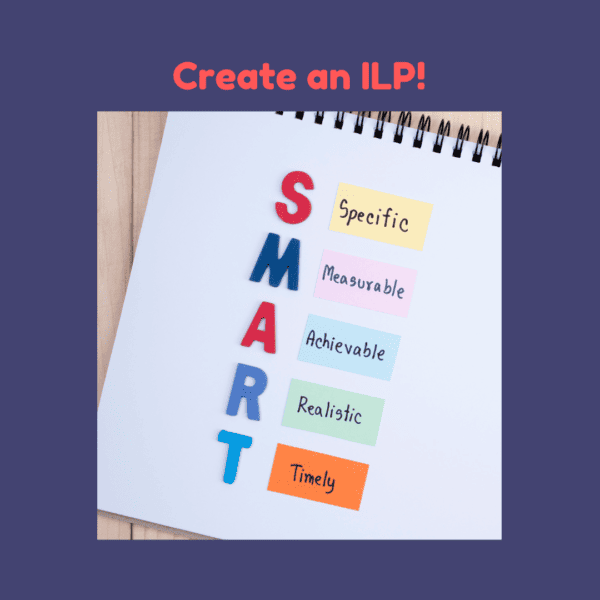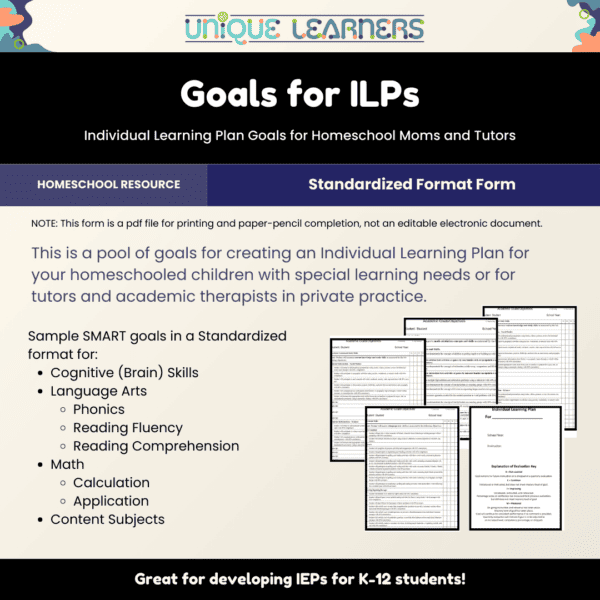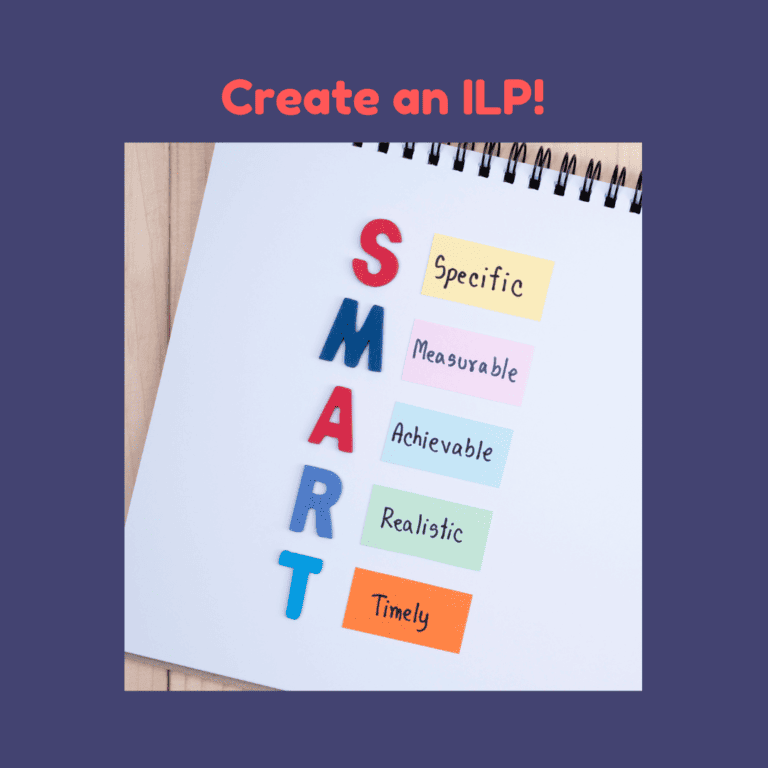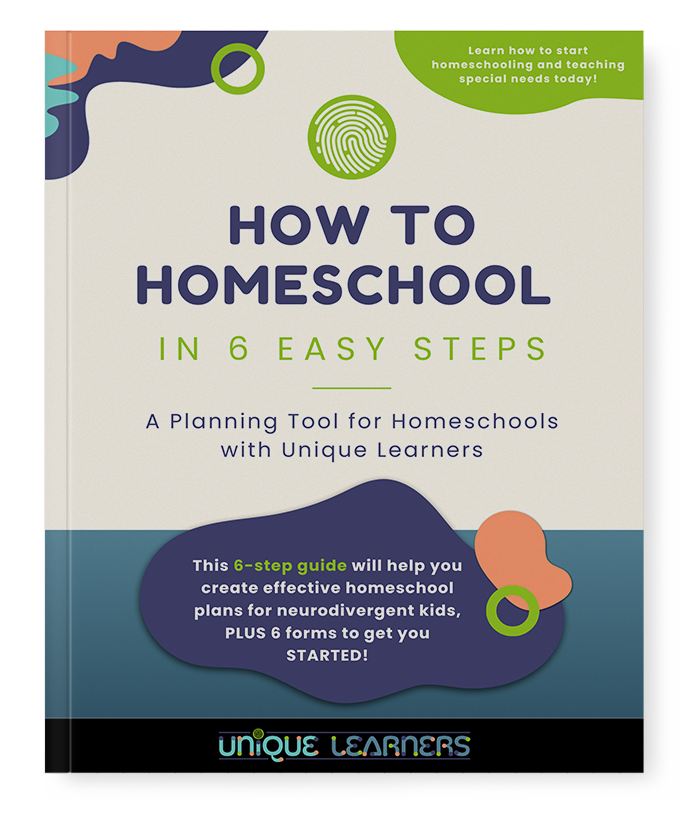I frequently get asked how an IEP will transfer to a homeschool. The simple answer is, “It can’t.” An IEP is a legal document that outlines a public school’s evidence that a student has a verifiable need to specialized instruction and what they plan to do about it. An IEP tells that a student qualifies for special education services, what specific goals in reading, writing, math, speech, or behavior will be worked on by special education staff, and what accommodations will be provided in a general education classroom. An IEP may address transportation issues or other needs that are specific to a particular child. But what about a homeschool ILP?

Of course, some states and school districts will still provide some services for homeschooled kids with special learning needs. However, since IDEA legislation isn’t addressed by most state homeschool laws, families are left without support by the public school system. Creating an effective Individual Learning Plan (ILP) involves tailoring educational goals that align with the specific strengths and needs of a special needs homeschool student. Below are potential goals, structured according to various areas of learning and development.
Keep in mind that when you decide to homeschool a kid with special needs, you are usually waiving the right to have specialized services. That doesn’t mean you are completely on your own. It also doesn’t mean that you must now use only regular homeschool curriculum with your child who requires specialized materials. You certainly can get services through your homeschool community, consultation from Homeschool Legal Defense Association, or private academic services, like Unique Learners.
I create my own Individual Learning Plan (ILP) for each of our kids that is not a legal document, but a practical working document. My ILPs outline the goals I want to focus on in our homeschool. Rather than addressing the goals separately, as public school provide services, I integrate working on the goals in every area of our learning, and even into how we do living!
Unique Learners provides a comprehensive pool of ILP goals that you can use to generate an ILP for your child. You can create goals for one subject area or for all areas of learning. I try to keep the goals simple and practical. The goals are SMART goals that can be measured to look at growth, yet simple enough to evaluate using a quick checklist code. I usually check on our ILP goals quarterly, so the ILP can become a report card for states that have that requirement.

Here are a few samples of some of the goals you can use in an ILP. If you want help to develop a learning plan for your child, be sure to download our Learning Plan Success Kit first. Walk through the 6 steps. Then reach out and we can give you suggestions that will make your ILP the guide for curriculum selection and how to do homeschool so that you and your child doesn’t end up in frustration!
Academic Goals
- Reading Comprehension: The student will improve reading comprehension skills at 4th grade reading level by identifying the main idea and details in a text with 80% accuracy in 4 out of 5 trials.
- Mathematics: The student will demonstrate an understanding of place value to the millions place by building numbers with base 10 blocks and writing the number with 90% accuracy on with 80% accuracy in 9 out of 10 trials..
- Writing: The student will write one well-structured paragraph with a topic sentence, three supporting details, and a concluding sentence once a week with 80% accuracy without assistance.
Communication Skills
- Expressive Language: The student will increase expressive language skills by using complete sentences, increasing from 2 word phrases to 5 words in 8 out of 10 observed exchanges.
- Receptive Language: The student will follow two-step directions accurately in 80% of directed activities with no more than one reminder prompt.
Social and Emotional Goals
- Social Interaction: The student will engage in 3 positive social interactions during free play activities with peers and supervised by a parent during weekly activities lasting an hour or more for 4 out of 5 activities consecutively.
- Emotional Regulation: The student will identify and name their emotions using a cuing poster in 8 out of 10 observed instances.
Motor Skills
- Fine Motor: Given specialized paper, the student will improve manuscript handwriting by touching lines and spacing between words with 80% accuracy.
- Gross Motor: By [date], the student will participate in physical activities that improve balance and coordination, successfully completing the designed obstacle course in 4 out of 5 trials.
Life Skills
- Independence: By [date], the student will complete a simple 5-step daily routine with minimal assistance in 4 out of 5 opportunities.
- Safety Skills: The student will demonstrate knowledge of personal and home safety rules by scoring at least 80% on a safety skills checklist.
Technology and Adaptive Skills
- Technology Use: The student will utilize educational software to complete assignments and reinforce skills for at least 20 minutes per day, 4 days per week.
- Adaptive Equipment: The student will independently operate any adaptive equipment necessary for accessing the curriculum (e.g., ACD, speech to text, calculator for math) in 9 out of 10 attempts.
Cognitive and Executive Functioning
- Attention and Focus: The student will increase their attention span during independent academic tasks to 15-minute intervals without redirection 4 out of 5 days each week.
- Auditory Processing: The student will complete auditory training exercises using Fast ForWord cognitive training 3 times a week for 30 minutes each, maintaining 80% accuracy while increasing toward 100% completion of each game.
Implementation and Review
Each goal should be reviewed regularly, and progress should be recorded to ensure that the student is on track or to make necessary adjustments to the ILP. I set up quarterly days to review our goals, and to adjust them to fit what we need to work on for the next quarter. Using these goals to create an Individual Learning Plan may also satisfy state requirements for a quarterly report card. Consideration should be given to the student’s particular interests and learning styles to foster engagement and participation. Collaboration between caregivers, specialized instructors, and the student themselves is crucial for the success of the ILP.
If you choose to hire a tutor or academic therapist, ask for their goals and request that their goals are evaluated in a time frame that coincides when you will be evaluating the ILP for goals you work on with your child.
You will find that with an ILP, your homeschool will be more focused on the skills your kiddo really needs to work on. The goals can be integrated into any part of your homeschool, including social studies and science! Remember, you can join our private Facebook group: Homeschool Help for Special Needs. Just let us know you saw the invitation here on our blog!
Check out our products in the shop to add more fun to your homeschool while learning important skills!

